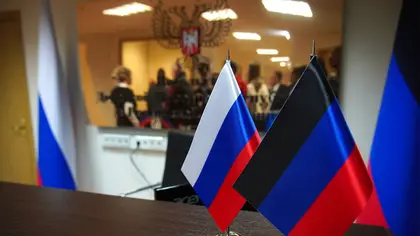Three Kremlin-installed authorities in Ukrainian regions under Russian control claimed victory Tuesday, Sep. 27, in annexation votes, drawing global outrage, as Moscow warned it could use nuclear weapons to defend the territories.
Ukraine and its allies have denounced the so-called referendums as a sham, saying the West would never recognise the results of the ballots that have dramatically ratcheted up the stakes of Russia’s seven-month invasion.
JOIN US ON TELEGRAM
Follow our coverage of the war on the @Kyivpost_official.
Pro-Russian authorities in Zaporizhzhia said 93.11 percent of voters backed joining Russia, according to preliminary results on Tuesday evening.
Shortly afterwards in Kherson, another Moscow-occupied region in southern Ukraine, officials said more than 87 percent of electors supported the move after all the ballots were counted.
In the eastern Luhansk region controlled by pro-Russia separatists, local authorities said more than 98 percent of the votes were in favour of annexation, according to local authorities.
Election officials in Moscow said voters casting their ballots in Russia had overwhelmingly backed annexation.
“Saving people in the territories where this referendum is taking place… is the focus of the attention of our entire society and of the entire country,” Russian President Vladimir Putin said earlier during a televised meeting with officials.
His spokesman Dmitry Peskov said the votes would have “radical” legal implications and that the so-called referendums “will also have consequences for security”, referring to Moscow’s threats to use nuclear weapons to defend its territory.

Zelensky Meets CIA Director William Burns in Ukraine
Ukrainian Foreign Minister Dmytro Kuleba however doubled down on Kyiv’s promise to push out Russian forces from its country, saying the votes “would not have any influence” on the battlefield.
Russian forces this month have suffered serious setbacks in Ukraine’s east and south, which observers say pushed Putin to rush ahead with the vote to cement Moscow’s authority there.
– Nuclear threat –
Putin said Russia would use any and all available means to defend its territory, implying that after the four regions were annexed Moscow could deploy strategic nuclear weapons to repulse Ukrainian attempts to retake the territory.
Pentagon spokesman General Patrick Ryder said the United States was taking the threat “seriously” but had seen nothing to change its nuclear posture.
“Russia must know that the nuclear war cannot be won and must never be fought,” said NATO chief Jens Stoltenberg.
The four Russian-occupied regions of Ukraine — Donetsk and Luhansk in the east and Kherson and Zaporizhzhia in the south — announced that they would hold the elections just days before voting began last Friday.
Together, they form a crucial land connection for the Kremlin between Russia and the Crimean peninsula, which Moscow annexed in 2014 and is otherwise only connected to the mainland by bridge.
US Secretary of State Antony Blinken vowed that the West would never recognise Russian annexations of the territories, threatening Moscow with “additional swift and severe costs” for its “diabolical scheme”.
French Foreign Minister Catherine Colonna, in Kyiv for a surprise visit to meet President Volodymyr Zelensky, called the polls a “masquerade” that would trigger further Western sanctions.
She also said moves were underway for a resolution against Russia at the current UN General Assembly in New York.
The United Nations “remains fully committed” to Ukraine’s territorial integrity “within its internationally recognised borders”, UN official Rosemary DiCarlo told a meeting of the Security Council.
Even Moscow’s closest ally since the start of the invasion, Beijing, said after the votes were announced last week that Russia should respect territorial integrity in the war.
– Counter-offensive –
The so-called referendums follow a pattern that Moscow utilised in Crimea after nationwide street demonstrations saw Ukraine’s Kremlin-friendly president ousted.
Like then, the outcome of the ballot was viewed by observers as a foregone conclusion. Election officials brought ballot boxes door-to-door in many cases accompanied by armed Russian forces.
Lawmakers are expected to vote hastily to annex the territories after the results are announced and Russian news agencies have said Putin could sign legislation formalising the land grab this week.
Ukrainian forces meanwhile have pursued their counter-offensive in the east.
The governor of the eastern Kharkiv region announced Tuesday its forces had recaptured Kupiansk-Vuzlovyi, “one of the largest logistical and railway junctions” in the region and not privy to this week’s vote.
Polling stations were open in Crimea for people who fled fighting after the Russian invasion in February.
“With my voice I want to try to make a small contribution to stopping the war,” 63-year-old Galina Korsakova from Donetsk told AFP.
“I really want to go home.”
Along with threats to use nuclear weapons, Putin announced a mobilisation of hundreds of thousands of Russian men to bolster Moscow’s army in Ukraine, sparking demonstrations and an exodus of men abroad.
The United Nations voiced alarm on Tuesday at credible reports of nearly 2,400 arrests in less than a week during nationwide protests in dozens of cities against the draft order.
The European Union’s border agency Frontex on Tuesday said the number of Russians entering the bloc last week was up 30 percent compared with the preceding week.
Ex-Soviet Georgia, invaded by Russia in 2008, said the numbers of Russians crossing its borders had increased to around 10,000 people daily since Putin’s announcement.
Kazakhstan, a Central Asian country on Russia’s southern border, said nearly 100,000 people had entered the country since Sep. 21.
You can also highlight the text and press Ctrl + Enter






